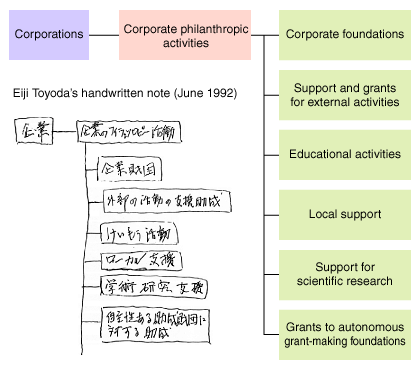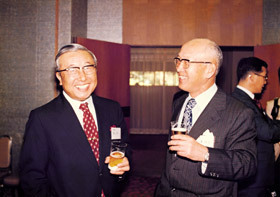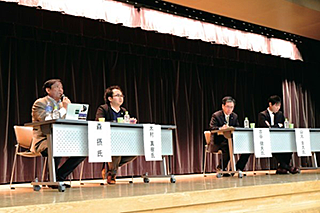- The 1st period from 1974 to 1997
- The 2nd period from 1998 to 2010
- The 3rd period from 2011 to 2016
- The 4th period from 2017 to the present
- The overview – the 50-year history – chronicles the history of the Toyota Foundation’s grant programs over the past half a century, including changes in their ideas and purposes, coupled with historical backgrounds, in four different time periods.
The 1st period from 1974 to 1997: The establishment and the ensuing years

With the mission of "contributing to the realization of a human-oriented society for the sake of greater human happiness,” the Toyota Foundation was established 50 years ago, in 1974, with contributions from Toyota Motor Co., Ltd. and Toyota Motor Sales Co. Ltd. (They were later merged to become what is now Toyota Motor Corp.) As stated in the prospectus, the Foundation aims to “view events from a global perspective as it works to support activities for the benefit of society,” and it was intended to provide grants internationally since its beginning while at the same time looking to make grants to social activities. Creating such a grant-making system was revolutionary in and of itself for a private Japanese grant foundation half a century ago.
During this 1st period, Japan achieved a considerable economic growth at home and abroad. And yet, Japan’s rapidly growing economic power was also fueling resentment among people in neighboring Southeast Asian countries, triggering a wave of anti-Japan demonstrations in the region. Meanwhile, environmental problems were becoming more serious in Japan as a result of the country’s economic development, which in turn fostered civic movements trying to tackle environmental issues. Addressing such social issues through its grant programs became the focus of the newly-established Foundation.
In light of these developments, the Foundation implemented its main grant programs as follows: International Grants targeting Southeast Asian countries were carried out from 1976 to 2004. This program was mainly focused on activities to research and preserve traditional cultures in local Southeast Asian communities. This was the first fully-fledged grant-making activity overseas by a Japanese private grant-offering foundation. This program would later spin off a capacity-building program for young researchers, Southeast Asian Studies Regional Exchange Program (SEASREP) designed to help research on Southeast Asia by local researchers, among other programs.

The next one is the Grant Program for Citizen Activities, implemented from 1988 to 2003, a framework for making grants to civic activities working on immediate environmental and other problems. Until then, most Japanese private grant-making foundations had by default provided research grants to university researchers. In contrast, this program made a leap conceptually in that grants were provided to activities by civic organizations. This conceptual leap helped generate momentum, prompting a large number of volunteers to help victims of the 1995 Great Hanshin-Awaji Earthquake and eventually leading to the establishment of the Act on Promotion of Specified Non-profit Activities (commonly referred to as the NPO Law) that allows civic activity organizations to obtain a legal status as an entity. As such, this program helped establish the social status of organizations engaged in civic activities.
Moreover, this period saw the fall of the Berlin Wall in 1989, putting an end to the Cold War that had heightened the tension in the international community for many years. This touched off the collapse of many communist and authoritarian regimes and instead advanced democracy and liberalization significantly, ushering in the era of globalization. Against such a historical backdrop, the research grant program “Creating a Society with Pluralistic Values” was conducted from 1994 to 2004, which presented a vision for an open society that would be run by citizens’ active participation, not ruled by the regime of authoritarian states.
The 2nd period from 1998 to 2010: Contributing to public interest through problem solving
![Survey Leading to the Restoration of the now-defunct Japan National Railways’ Shihoro Line [D02-K-256] Plans for a barrier-free handcar-driving experience against the backdrop of abundant nature of Daisetsuzan National Park in central Hokkaido.](../../../../service/50th/overview/img/04_02.jpg)
 ] Plans for a barrier-free handcar-driving experience against the backdrop of abundant nature of Daisetsuzan National Park in central Hokkaido.
] Plans for a barrier-free handcar-driving experience against the backdrop of abundant nature of Daisetsuzan National Park in central Hokkaido.After the end of the Cold War, the 1990s saw advances in democratization around the world and widespread optimism. However, a big shock wave swept across the globe near the end of the decade; it was the Asia financial crisis that started off in Thailand in 1997 and spread around the entire Asia region. This was followed by a financial crisis in Japan. A chain of these economic crises proved to be a big inflection point for a country that had enjoyed runaway economic growth up until the early 1990s – the beginning of a long period of Japan’s economic stagnation.
It was during this period of economic stagnation that a decline of Japan’s local communities was gradually becoming more apparent. Up until then, the Toyota Foundation’s grant-making was targeted mainly at international activities, particularly with focus on the Asia region, and activities involving citizens living in big cities. From this period onward, however, the Foundation started to shift focus to local communities and the kind of issues facing them. At the same time, the problem-solving aspect has since become more prominent in the grant program’s objective, as demanded by the times. This change represents a departure from more moderate concepts upheld until then by the Foundation – the preservation of traditional local cultures, the promotion of international research exchanges, and the encouragement of civic activities. For this reason, the Foundation tried different approaches in the planning and operation of its grant programs during this 2nd period. Meanwhile, the reform of Japan's public-interest corporations system, launched in the early 2000s, requires that non-profit corporations, including private grant-making foundations, contribute clearly to public interest, which in turn has helped push a trend toward problem-solving efforts.
![Improvement of Rural Livelihoods Through a Community Participation Approach in Bangladesh by Using the Integration of Rice-Duck Farming Methods [D09-N-230]](../../../../service/50th/overview/img/joint05_001.png)
 ]
]Some of the main grant programs conducted during this period are as follows:
The Grant Program for Community Activities, implemented from 2004 to 2011, was innovative in that it put focus on declining local communities in Japan and how to resolve the issues facing them as opposed to civic activities in urban areas. This was the start of a grant program that has now become the Grant Program for Community Activities in Japan.
The next one is the Asian Neighbors Program, implemented from 2009 to 2012, which aimed at supporting practical projects addressing issues facing local communities in Asia.
Moreover, the Research Grant Program “The Search for the Richness of Human Life and Activity – ‘Revitalizing Local Communities Under Globalization,’” implemented from 2008 to 2009, was noteworthy in that it set the tone for making grants to problem solving-type projects on revitalizing local communities, which was a widely applicable theme, breaking away from the premise of the previous research grant aimed at basic research with social appeal.
As such, the Foundation has managed to restructure the framework of grant-making programs around the concept of problem solving through various attempts. But times do change dramatically at times. The year 2009 saw the collapse of U.S. investment bank Lehman Brothers that triggered one of the biggest financial crises in history hitting many parts of the world. As a result, international order was being undermined and Japan’s place in Asia was being changed, which affected the international activities of the Foundation.
The 3rd period from 2011 to 2016: The Great East Japan Earthquake and the ensuing years
![Ageing Asia and Condition of Foreign Care Workers: Towards Competence Based Human Resource Development and Harmonization of Care [D13-N-0086]](../../../../service/50th/overview/img/joint14_001.png)
 ]
]A snapshot of physically challenged people in Singapore and project members.
Even before the impact of the global financial crisis subsided, the Great East Japan Earthquake struck the northeastern part of Japan in 2011. The Toyota Foundation started to provide grants under the Great East Japan Earthquake “Special Subject” framework, implemented from 2011 to 2017, which allowed the Foundation to follow the recovery process from offering emergency relief to disaster victims to building a community at a disaster public housing compound. It was the first time that the Foundation adopted an approach to supporting victims of large-scale natural disasters under the Great East Japan Earthquake “Special Subject” framework, which marked an epoch-making moment in the Foundation’s history.
Contrary to the continued stagnation of the Japanese economy during this 3rd period, Asian countries achieved robust economic growth. Japan’s once overwhelming dominance in Asia was already lost by then. That led to an overhaul of the direction of the Foundation’s international program. The newly-introduced International Grant Program, implemented from 2013 to the present, serves as a framework for making grants to mutual learning on-site by practitioners and others working to resolve various social issues in Japan and other Asian countries. This program is quite unique in that it helped redefine the relationship between Japan and other Asian countries as an equal relationship, not as the past hierarchical relationship between Japan as a donor country and Asian countries as donor recipients.
At around this time, however, a positive atmosphere arising after the end of Cold war was beginning to dissipate in the international community. The collapse of Lehman Brothers became a watershed moment, exposing the dark side of globalization such as poverty even in industrialized countries. This triggered a series of events, including the Brexit in 2016, that could threaten to reverse the tide of globalization. In Japan, the declining birthrate and aging population were becoming ever more serious, further clouding the country’s future outlook.

Under these social circumstances, the Foundation launched the Research Grant Program titled “Exploring New Values for Society,” implemented from 2014 to 2019, which was designed to provide grants to researchers exploring basic ideas and methodologies needed to resolve social issues. While the Research Grant titled “Creating a Society with Pluralistic Values” -- implemented immediately after the end of the Cold war -- sought to present a clear image of what a future society should look like on the macro level, this renewed research grant was characterized by its new approach to collecting micro-level ideas needed to address social issues.
Also deserving particular attention was Toyota NPO College “Kaiketsu,” implemented from 2016 to the present, a seminar designed for grant-awarded nonprofit organizations to learn the accumulated methods of Toyota Motor Corporation’s “Mondai Kaiketsu (Problem Solving)” as a way to deliver impactful results. Currently, a growing number of grant-making organizations in Japan are placing greater emphasis on the so-called “non-financial support” – a type of support involving the learning and sharing of various know-how – alongside the provision of grant money. This seminar can be described as a pioneering framework in this broader trend.
The 4th period from 2017 to the present: Building a new social system
![Harmonisation towards the establishment of Person-centred Robotics-aided Care System (HARP: RoCS) [D16-ST-0005]](../../../../service/50th/overview/img/joint30_001.png)
 ]
]A guest is seen talking to a humanoid care robot Palro named Hachi, developed by Fuji Soft Inc., at a nursing care facility in Nishitokyo City, western Tokyo. (Photographed by Yoshimi Okamoto and provided by Kazuko Obayashi.)
Even in the face of the risks posed by the Covid-19 pandemic, the Toyota Foundation has continued to take on new challenges during this 4th period. The first of those challenges is the introduction of a new grant framework called the Special Subject. This framework is characterized by its sharper focus on selecting social issues to be addressed through the grant offering, which allows the Foundation to clearly convey its concerns to society. The current Special Subjects are as follows:
- New Society with Advanced Technologies, implemented from 2018 to the present
- Migrants and Japanese Society, implemented from 2019 to the present
- Population Decline in Japanese Society, implemented from 2024
A labor shortage caused by Japan’s falling birthrate and aging population poses a serious problem to Japanese society. To resolve this issue, these Special Subjects are expected to generate synergies and deliver much-desired outcomes.
Next, the Foundation was able to build a tangible partnership with an outside institution for the first time in its history. Under the Interlinkages and Innovation for Future Societies of the Research Grant’s Partnership Program, implemented from 2022 to the present, the Foundation has since partnered with the Institute for Future Initiatives (IFI), the University of Tokyo, in a bid to nurture young researchers working on research to transform social systems. It is hoped that the intellectual assets and human networks developed by the IFI will be of benefit to the new task of fostering next-generation researchers.
In addition, the Foundation created a new framework “Fostering the Autonomous Society under New Normal Based upon the Inventive Ideas,” implemented from 2021 to the present, in the Grant Program for Community Activities in Japan. This is groundbreaking in that the framework envisions a society post-Covid 19 crisis by actively leveraging advanced communication technologies such as big data, cloud, and database when it comes to practices in local communities.
Furthermore, the Foundation has been stressing the need to build a personal network of grant recipients in recent years. Debriefing sessions, workshops, opinion-exchange meetings are held actively. Efforts are also being made to organize a network of the past grantees. As such, exchanging information about their projects amongst the current and past grantees is expected to further help deliver impactful outcomes and disseminate such results to society.
